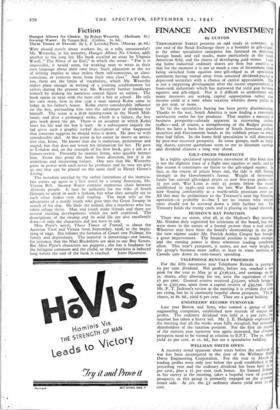Fiction
These Times of Travail. By L. F. Loyeclay Prior. (Murray. 98.6(1.)
Wiiv should novels about workers be, as a rule, unsuccessful? Mr. Westerby, in his morality, Hunger Allows No Choice, adds another to the long list. His book recalled an essay by Virginia Woolf, "The Niece of an Earl," in which she wrote: "For it is impossible, it would seem, for working men to write in their own language about their own lives. Such education as the act of writing implies at once makes them self-conscious, or class- conscious, or removes them from their own class." And then, too, there are the limits of vocabulary, which Mr. Westerby makes plain enough in writing of a training establishment for sailors during the present war. Mr. Westerby further handicaps himself by making his nameless central figure an author. The book opens in 1930 with the hero still a boy at school. He tells his own story, how in that year a man named Kohn came to lodge in his father's house. Kohn exerts considerable influence on the boy, persuading him into the adventure of thinking for himself. The scene is a drab mining-town in the North Mid- lands, and after a prolonged strike, which is a failure, the boy gets work down the pit. There is an accident in which Kohn loses his life and the boy is hurt. At a subsequent inquiry the lad gives such a graphic verbal description of what happened that someone suggests he should write it down. He does so with considerable skill. At this point in his career he meets an attrac- tive slut, Irene. He knows that she is malicious, pretentious and stupid, but that does not lessen his infatuation for her. He goes to London and, on the strength of his first book, gets a job as a feature-writer. Presently he marries Irene, who quickly betrays him. From this point the book loses direction, but it is an ambitious and interesting failure. One sees that Mr. Westerby gains in power with each novel he produces and he may yet give us one that can be placed on the same shelf as Henry Green's The boredom entailed by the verbal limitations of the inarticu- late comes up again in a first novel by a young American, Mr. Vereen Bell. Swamp Water contains numerous chats between illiterate people. It may be authentic for the folks of South Georgia to speak in such a fashion, but what they actually say to each other makes very dull reading. The book tells us the adventures of a sturdy youth who goes into the Great Swamp in search of his dog. He finds the animal, also a murderer who has taken refuge there. Man and youth make friends and there are several exciting developments which are well contrived. The descriptions of the swamp and its wild life are also excellently done—if only the characters did not have to talk. Miss Prior's novel, These Times of Travail, is about the Austrian Tirol and Vienna from September, 1938, to the begin- ning of 1940. She follows the fortunes of Count von Feilmar, his family and dependants. The material is interesting—one learns, for instance, that the Nazi Blackshirts are akin to our Boy Scouts. But Miss Prior's characters are puppets ; she has a fondness for the bilingual comment and the cliché, so that weariness is induced long before the end of the book is reached. JOHN HAMMON.


























 Previous page
Previous page